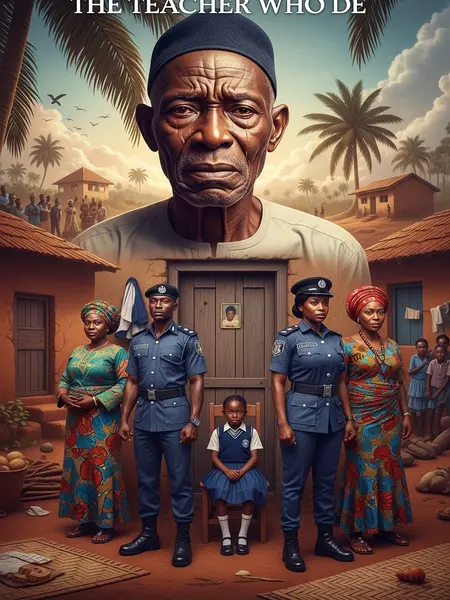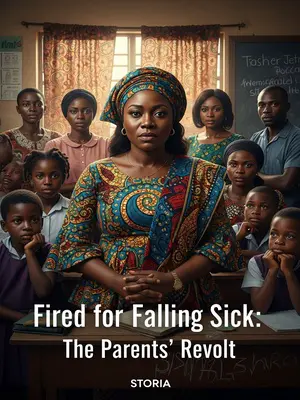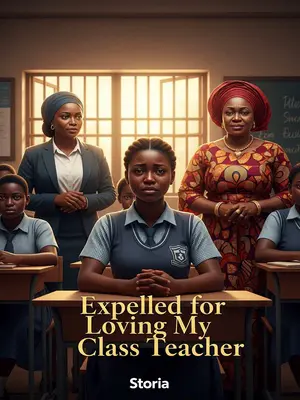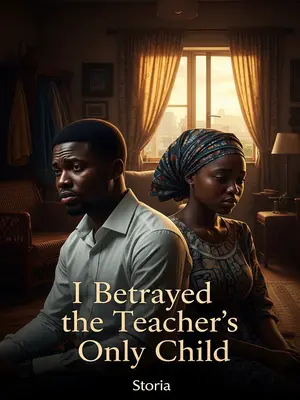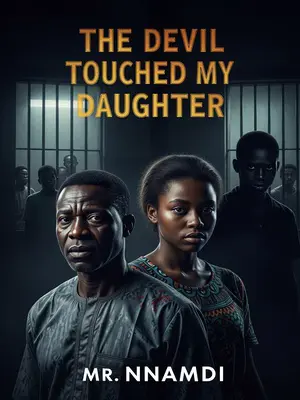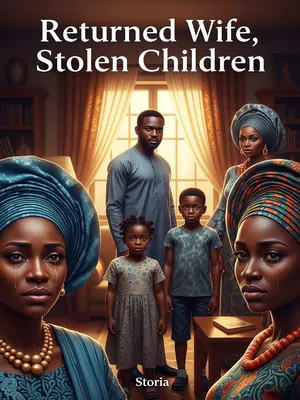Chapter 5: Too Late for Innocence
Early the next morning, Baba Kola’s kiosk didn’t open.
People noticed quickly—who else sold akara so early? Some children waited outside, eyeing the shut door, before the whisper started spreading.
A neighbour, sensing something was wrong, entered and found he had hanged himself inside.
The sight of his lifeless body made the neighbour shout, “Jesus! Baba Kola don die!” People gathered, peeking through the cracked window, some crossing themselves, others spitting on the ground for protection, muttering, “Make im spirit no waka enter my house.”
When we got there, we saw that people had poured rubbish at his door. Red paint had been splashed on the front, with dirty, insulting words written everywhere. Even the wall beside the kiosk had nasty graffiti.
Some of the graffiti called him names I cannot repeat. Someone even drew a crude image, cursing his lineage. One old woman shook her head, whispering, “Na mouth kill am, no be rope.”
We learnt all this was done by villagers after we took him away, to curse him.
It was their way of making sure his spirit knew he was no longer welcome. Old ways die hard in these places—if you disgrace the community, even your ghost won’t find rest.
But our test results were out: Baba Kola was not the one who slept with Ifunanya.
I stared at the results, my heart pounding. How do you bring back a man already buried by gossip?
So, most likely, he was not the one who touched Amina either.
Tunde cursed under his breath. The truth land, but e too late—Baba Kola don go.
Even so, as we handled his body, villagers still whispered that he killed himself out of guilt.
No evidence could change their minds. “If he no do am, why he go hang?” some muttered, shaking their heads as if convinced.
We all knew he wasn’t a suicide. What really killed him was wicked gossip.
Rumour travels faster than truth in these villages. What truly ended Baba Kola’s life was a storm of suspicion and shame.
But another question came up: if Baba Kola wasn’t the culprit, why did Amina accuse him?
I looked at the small girl’s frightened eyes in my memory. Was she lying to save herself? Or did someone put the words in her mouth?
At the same time, we got bad news about their other classmate, Blessing.
It was as if bad thing dey do roll call for the whole class—one after the other.
Blessing was also a left-behind child, living with her grandmother while her parents worked far away. She didn’t get checked the day before, when Amina’s case exploded.
Her grandmother was old, but quick to act once she heard the news. “Me, I no go wait for police!” she declared, pulling Blessing to the clinic herself.
But after that incident, her grandmother quickly took her to the hospital. The result was the same: hymen broken.
The nurse sighed as she handed us the report. “This village needs deliverance,” she whispered.
While we were still discussing Baba Kola’s burial with the village elders, Amina’s parents and Blessing’s grandmother had already gone to the elders to demand justice.
They came storming into the palace, voices raised, not caring who heard. Even the elders seemed afraid to face them.
They didn’t bring the children, just their anger.
Their words were sharp as cane—“Our children have suffered, somebody must pay!”
At first, we thought they were angry at us for being slow to find the real criminal.
I braced myself for more accusations about police laziness or corruption.
But that wasn’t it.
Their demands were not for truth but for payment, and that cut deeper than any insult.
They didn’t really care about the real criminal at all.
Their eyes were already calculating. In the village, some wounds fester because people focus on gain, not healing.
Because after all the shouting, what we heard was:
“Now that Baba Kola is dead, how will he pay our children for what they suffered?”
The question was like cold water. I stared at them, wondering if maybe pain had twisted their hearts too.
Exactly—even though we told them Baba Kola was not the real culprit, they didn’t mind.
It was as if the facts no longer mattered. Their faces were set, voices louder. “Somebody must pay! Open his shop—give us his things!”
Things got even more messy as they started demanding: asking us to open Baba Kola’s kiosk, check for his property, and give it to their children as compensation.
The argument turned ugly. “His fridge, his TV, even his generator—bring it out!” One man shouted, pounding the table. Tunde’s patience was running out.
Of course, we refused. Baba Kola’s case wasn’t settled, and the kiosk was still sealed.
We stood our ground. The case was not closed, and the law was the law. The elders sighed, eyes darting nervously.
The village elders were also helpless, only promising to sort things quickly, find the real criminal, and—of course—give compensation soon…
They muttered among themselves in low Igbo, as if hoping the problem would disappear if they delayed long enough. But nothing vanished—only trust.
After a long argument, they finally left, though not happy.
As they stormed out, I caught a glimpse of Amina’s mother’s face—angry, but not grieving. My own heart was heavy.
This left me with a strange feeling.
I couldn’t help but wonder: was this about justice, or just another village hustle dressed up in sorrow?
At least for Amina’s parents and Blessing’s grandmother, it looked like the truth about the children’s abuse didn’t matter. What they wanted was money.
Tunde shook his head. “Na so poverty dey spoil people mind. No be justice dem dey find, na settlement.”
Another thing: during the argument, we suggested that the officers talk to the girls again. But the guardians all refused.
The answer was a firm “No.” The children were “not well,” “not ready,” “still afraid.” The door was shut to us, every time.
Looking back, from the start of the case till now, nobody had been able to speak with the girls alone. Every talk needed the guardians’ permission, and they were always there.
Every interview was a performance, with adults hovering, watching every move. I started to see the pattern: the children’s voices were never their own.
At first, I thought they were just protecting the children. But after the elders’ incident, I started thinking: maybe they didn’t want us to hear anything from the children. Maybe blaming Baba Kola wasn’t really the girls’ own idea.
I made a note in my mind—children’s silence can be bought, too.
But at the time, we had no way to go round the guardians and question the girls directly.
Even the chief warned us, “No cause another wahala. The parents fit bring juju if you press them too much.”
So, the case got stuck again.
The police post became quiet, each of us lost in thought. The villagers started to avoid our eyes.
We had to try another way.
Tunde and I stayed up late, planning. This matter would not end until the truth came out, by force or by fate.
That night, I sat in the dark, listening to the silence. In that silence, I heard every lie the village had told itself.
